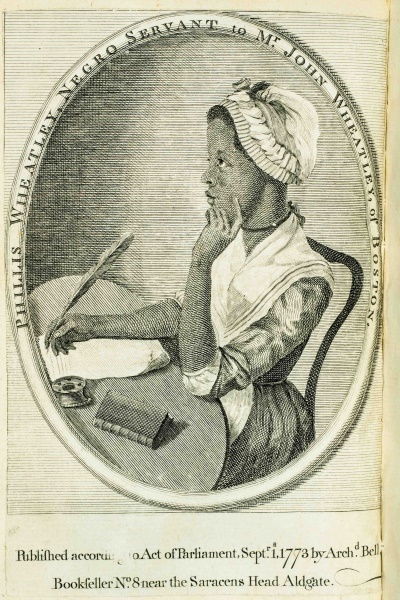Wheatley: ‘Poems on Various Subjects, Religious and Moral’
Phillis Wheatley’s Poems on Various Subjects, Religious and Moral was the first published book to have been written by an African American. Born in West Africa around 1753, this girl, whose African name is unknown, was enslaved at about age seven. Bought in Boston by John Wheatley for his wife, she was named Phillis for the slave ship on which she had sailed and given her owners’ surname. When, as a young girl, she showed interest in writing, the Wheatleys determined to educate her. By age twelve, she was reading classical works in Greek and Latin as well as the Bible, and by seventeen, she had published her first poem.
The Wheatleys took pride in the girl’s extraordinary accomplishments and showed off her talents among their New England circle. This is especially notable because literacy was rare among American slaves. Indeed, it was generally prohibited and deemed a threat to the institution of slavery.
In 1773, Wheatley visited England with her owner’s son; there, she met the Countess of Huntingdon, who offered to sponsor the publication her poems in London. Wheatley then dedicated the volume to the countess. The portrait of Wheatley that appears as the book’s frontispiece was done by Scipio Moorhead, also a slave. When doubts were raised, back in the American colonies, as to the authenticity of the poems’ authorship, a group of eighteen prominent Massachusetts men, including John Hancock, signed a document corroborating Wheatley’s originality. This remarkable attestation appears in the preface to the book itself.
Wheatley admired English poets Alexander Pope, John Milton, and Thomas Gray, and she employed the rhyming couplet form for which Pope was famous. Her poems addressed subjects common to her time. Many took Christian religious themes—though she also frequently included sun gods in her work; others paid homage to public figures. In 1775, she sent a poem in praise of George Washington to the General. Washington received the poem warmly and invited Wheatley to visit him, which she did. While neither slavery nor race were the overt focus of her work, Wheatley occasionally addressed these issues, speaking directly as an African slave woman to her readers—a poetic form of address for which she had no literary models. In “On Being Brought from Africa to America,” she concludes, “Some view that sable race with scornful eye:/ ‘Their color is a diabolic dye.’ / Remember, Christians, Negroes black as Cain / May be refined and join the angelic strain.”
Wheatley’s fame was short-lived, and she died in poverty and obscurity before her poems were reprinted in the United States in 1786. She was granted freedom upon John Wheatley’s death, and though she then married a freedman, he landed in debtors’ prison, and she died soon after, in 1784. All three of her children died in infancy.
It was only with the late twentieth-century development of studies in African American and women’s literature that Phillis Wheatley’s work drew scholarly attention. Her status as a “first” remains highly important, but critical evaluations have been mixed, since from a modern point of view her writing can appear too eager to please white readers at the expense of racial pride. As a slave, of course, her literary choices, like her life options, were severely constrained. That Phillis Wheatley wrote at all, and that she had the temerity to engage in literary conversation with the established greats in literature and society, is remarkable.
—Sheila Hassell Hughes, PhD, Professor, English
"On Being Brought from Africa to America" by Phillis Wheatley from "Poems on Various Subjects, Religious and Moral" read by Sheila Hassell Hughes, Professor. University of Dayton. Department of English

